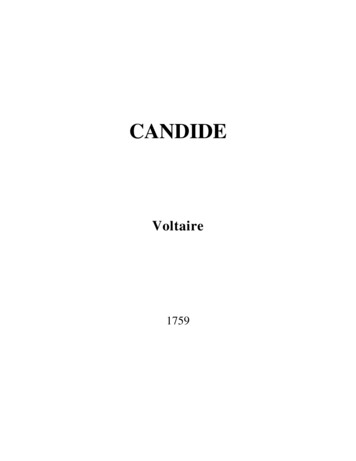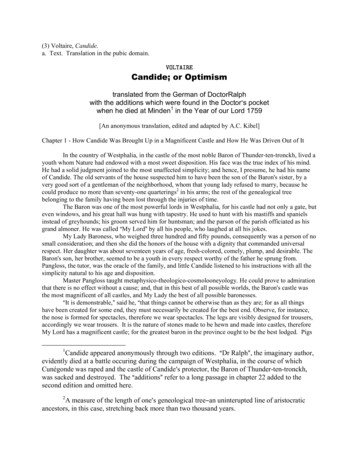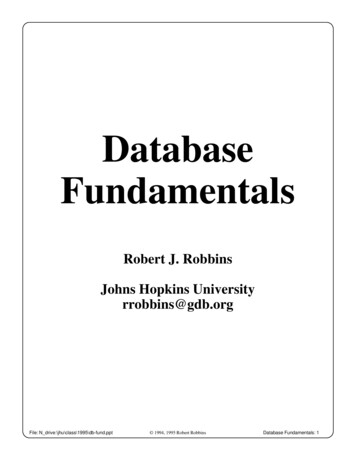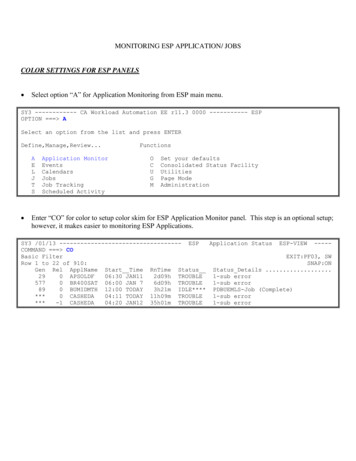
Transcription
CANDIDEVoltaire1759
1998, Electronic Scholarly Publishing Projecthttp://www.esp.orgThis electronic edition is made freely available for scholarly oreducational purposes, provided that this copyright notice isincluded. The manuscript may not be reprinted or redistributed forcommercial purposes without permission.
TABLE OF CONTENTSCHAPTER 1.1How Candide Was Brought Up in a Magnificent Castle and How HeWas Driven ThenceCHAPTER 2.3What Befell Candide among the BulgariansCHAPTER 3.6How Candide Escaped from the Bulgarians and What Befell HimAfterwardCHAPTER 4.8How Candide Found His Old Master Pangloss Again and WhatCHAPTER 5.11A Tempest, a Shipwreck, an Earthquake, and What Else Befell Dr.Pangloss, Candide, and James, the AnabaptistCHAPTER 6.14How the Portuguese Made a Superb Auto-De-Fe to Prevent AnyFuture Earthquakes, and How Candide Underwent PublicFlagellationCHAPTER 7.16How the Old Woman Took Care Of Candide, and How He Found theObject of His LoveCHAPTER 8.18Cunegund’s StoryCHAPTER 9.21What Happened to Cunegund, Candide, the Grand Inquisitor, and theJewCHAPTER 10 .23In What Distress Candide, Cunegund, and the Old Woman Arrive atCadiz, and Of Their EmbarkationCHAPTER 11 .25The History of the Old Womaniii
CHAPTER 12 .28The Adventures of the Old Woman ContinuedCHAPTER 13 .32How Candide Was Obliged to Leave the Fair Cunegund and the OldWomanCHAPTER 14 .35The Reception Candide and Cacambo Met with among the Jesuits inParaguayCHAPTER 15 .38How Candide Killed the Brother of His Dear CunegundCHAPTER 16 .40What Happened to Our Two Travelers with Two Girls, Two Monkeys,and the Savages, Called OreillonsCHAPTER 17 .44Candide and His Valet Arrive in the Country of El Dorado-WhatThey Saw ThereCHAPTER 18 .48What They Saw in the Country of El DoradoCHAPTER 19 .53What Happened to Them at Surinam, and How Candide BecameAcquainted with MartinCHAPTER 20 .58What Befell Candide and Martin on Their PassageCHAPTER 21 .61Candide and Martin, While Thus Reasoning with Each Other, DrawNear to the Coast of FranceCHAPTER 22 .63What Happened to Candide and Martin in FranceCHAPTER 23 .72Candide and Martin Touch upon the English Coast-What They SeeThereiv
CHAPTER 24 .74Of Pacquette and Friar GirofleeCHAPTER 25 .78Candide and Martin Pay a Visit to Seignor Pococurante, a NobleVenetianCHAPTER 26 .83Candide and Martin Sup with Six Sharpers-Who They WereCHAPTER 27 .86Candide’s Voyage to ConstantinopleCHAPTER 28 .90What Befell Candide, Cunegund, Pangloss, Martin, etc.CHAPTER 29 IN .92What Manner Candide Found Miss Cunegund and the Old WomanAgainCHAPTER 30 .94Conclusionv
vi
CHAPTER 1How Candide Was Brought Up in a Magnificent Castleand How He Was Driven ThenceIn the country of Westphalia, in the castle of the most noble Baronof Thunder–ten–tronckh, lived a youth whom Nature had endowed witha most sweet disposition. His face was the true index of his mind. Hehad a solid judgment joined to the most unaffected simplicity; andhence, I presume, he had his name of Candide. The old servants of thehouse suspected him to have been the son of the Baron’s sister, by avery good sort of a gentleman of the neighborhood, whom that younglady refused to marry, because he could produce no more thanthreescore and eleven quarterings in his arms; the rest of thegenealogical tree belonging to the family having been lost through theinjuries of time.The Baron was one of the most powerful lords in Westphalia, forhis castle had not only a gate, but even windows, and his great hall washung with tapestry. He used to hunt with his mastiffs and spanielsinstead of greyhounds; his groom served him for huntsman; and theparson of the parish officiated as his grand almoner. He was called “MyLord” by all his people, and he never told a story but everyone laughedat it.My Lady Baroness, who weighed three hundred and fifty pounds,consequently was a person of no small consideration; and then she didthe honors of the house with a dignity that commanded universalrespect. Her daughter was about seventeen years of age, fresh–colored,comely, plump, and desirable. The Baron’s son seemed to be a youth inevery respect worthy of the father he sprung from. Pangloss, thepreceptor, was the oracle of the family, and little Candide listened tohis instructions with all the simplicity natural to his age and disposition.Master Pangloss taught the metaphysico–theologo–cosmolonigology.He could prove to admiration that there is no effect without acause; and, that in this best of all possible worlds, the Baron’s castlewas the most magnificent of all castles, and My Lady the best of allpossible baronesses.“It is demonstrable,” said he, “that things cannot be otherwise thanas they are; for as all things have been created for some end, they must1
2VOLTAIREnecessarily be created for the best end. Observe, for instance, the noseis formed for spectacles, therefore we wear spectacles. The legs arevisibly designed for stockings, accordingly we wear stockings. Stoneswere made to be hewn and to construct castles, therefore My Lord has amagnificent castle; for the greatest baron in the province ought to bethe best lodged. Swine were intended to be eaten, therefore we eat porkall the year round: and they, who assert that everything is right, do notexpress themselves correctly; they should say that everything is best.”Candide listened attentively and believed implicitly, for he thoughtMiss Cunegund excessively handsome, though he never had thecourage to tell her so. He concluded that next to the happiness of beingBaron of Thunder–ten–tronckh, the next was that of being MissCunegund, the next that of seeing her every day, and the last that ofhearing the doctrine of Master Pangloss, the greatest philosopher of thewhole province, and consequently of the whole world.One day when Miss Cunegund went to take a walk in a littleneighboring wood which was called a park, she saw, through thebushes, the sage Doctor Pangloss giving a lecture in experimentalphilosophy to her mother’s chambermaid, a little brown wench, verypretty, and very tractable. As Miss Cunegund had a great dispositionfor the sciences, she observed with the utmost attention the experimentswhich were repeated before her eyes; she perfectly well understood theforce of the doctor’s reasoning upon causes and effects. She retiredgreatly flurried, quite pensive and filled with the desire of knowledge,imagining that she might be a sufficing reason for young Candide, andhe for her.On her way back she happened to meet the young man; sheblushed, he blushed also; she wished him a good morning in a flatteringtone, he returned the salute, without knowing what he said. The nextday, as they were rising from dinner, Cunegund and Candide slippedbehind the screen. The miss dropped her handkerchief, the young manpicked it up. She innocently took hold of his hand, and he as innocentlykissed hers with a warmth, a sensibility, a grace–all very particular;their lips met; their eyes sparkled; their knees trembled; their handsstrayed. The Baron chanced to come by; he beheld the cause and effect,and, without hesitation, saluted Candide with some notable kicks on thebreech and drove him out of doors. The lovely Miss Cunegund faintedaway, and, as soon as she came to herself, the Baroness boxed her ears.Thus a general consternation was spread over this most magnificentand most agreeable of all possible castles.
CHAPTER 2What Befell Candide among the BulgariansCandide, thus driven out of this terrestrial paradise, rambled a longtime without knowing where he went; sometimes he raised his eyes, allbedewed with tears, towards heaven, and sometimes he cast amelancholy look towards the magnificent castle, where dwelt the fairestof young baronesses. He laid himself down to sleep in a furrow,heartbroken, and supperless. The snow fell in great flakes, and, in themorning when he awoke, he was almost frozen to death; however, hemade shift to crawl to the next town, which was called Wald–berghofftrarbkdikdorff, without a penny in his pocket, and half dead withhunger and fatigue. He took up his stand at the door of an inn. He hadnot been long there before two men dressed in blue fixed their eyessteadfastly upon him.“Faith, comrade,” said one of them to the other, “yonder is a wellmade young fellow and of the right size.” Upon which they made up toCandide and with the greatest civility and politeness invited him to dinewith them.“Gentlemen,” replied Candide, with a most engaging modesty, youdo me much honor, but upon my word I have no money.”“Money, sir!” said one of the blues to him, “young persons of yourappearance and merit never pay anything; why, are not you five feetfive inches high?”“Yes, gentlemen, that is really my size,” replied he, with a lowbow.“Come then, sir, sit down along with us; we will not only pay yourreckoning, but will never suffer such a clever young fellow as you towant money. Men were born to assist one another.”“You are perfectly right, gentlemen,” said Candide, “this isprecisely the doctrine of Master Pangloss; and I am convinced thateverything is for the best.”His generous companions next entreated him to accept of a fewcrowns, which he readily complied with, at the same time offering themhis note for the payment, which they refused, and sat down to table.“Have you not a great affection for –”“O yes! I have a great affection for the lovely Miss Cunegund.”3
4VOLTAIRE“Maybe so,” replied one of the blues, “but that is not thequestion!We ask you whether you have not a great affection for theKing of the Bulgarians?”“For the King of the Bulgarians?” said Candide. “Oh, Lord! not atall, why I never saw him in my life.”“Is it possible? Oh, he is a most charming king! Come, we mustdrink his health.”“With all my heart, gentlemen,” said Candide, and off he tossed hisglass.“Bravo!” cried the blues; “you are now the support, the defender,the hero of the Bulgarians; your fortune is made; you are in the highroad to glory.”So saying, they handcuffed him, and carried him away to theregiment. There he was made to wheel about to the right, to the left, todraw his rammer, to return his rammer, to present, to fire, to march, andthey gave him thirty blows with a cane; the next day he performed hisexercise a little better, and they gave him but twenty; the day followinghe came off with ten, and was looked upon as a young fellow ofsurprising genius by all his comrades.Candide was struck with amazement, and could not for the soul ofhim conceive how he came to be a hero. One fine spring morning, hetook it into his head to take a walk, and he marched straight forward,conceiving it to be a privilege of the human species, as well as of thebrute creation, to make use of their legs how and when they pleased. Hehad not gone above two leagues when he was overtaken by four otherheroes, six feet high, who bound him neck and heels, and carried him toa dungeon. A courtmartial sat upon him, and he was asked which heliked better, to run the gauntlet six and thirty times through the wholeregiment, or to have his brains blown out with a dozen musket–balls?In vain did he remonstrate to them that the human will is free, andthat he chose neither; they obliged him to make a choice, and hedetermined, in virtue of that divine gift called free will, to run thegauntlet six and thirty times.He had gone through his discipline twice, and the regiment beingcomposed of 2,000 men, they composed for him exactly 4,000 strokes,which laid bare all his muscles and nerves from the nape of his neck tohis stern. As they were preparing to make h
whole province, and consequently of the whole world. One day when Miss Cunegund went to take a walk in a little neighboring wood which was called a park, she saw, through the bushes, the sage Doctor Pangloss giving a lecture in experimental philosophy to her mother’s chambermaid, a little brown wench, very pretty, and very tractable. As Miss Cunegund had a great disposition for the sciences .











